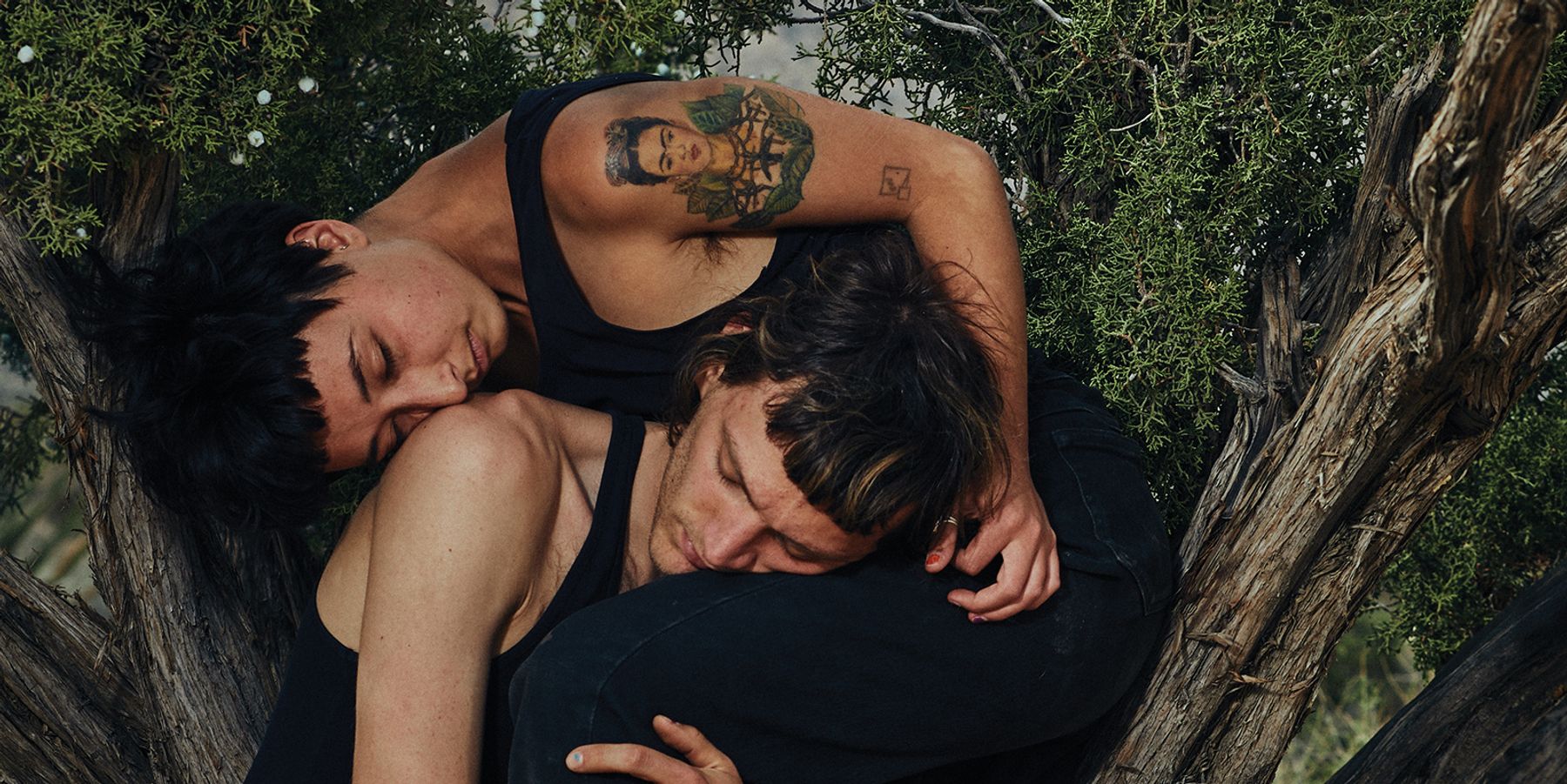
Sex & Dating
How 6 Different Non-Monogamous Relationships Are Redefining Love
by Sandra Song
14 February 2019

While non-monogamy isn't a new topic of discussion in 2019, the conversation surrounding it continues to evolve. Long gone are the days where swinging was the only alternative relationship model in the public eye. Now, it's all about the multitudes that a term as broad as "non-monogamy" can encompass.
Contrary to popular belief, non-monogamy can encompass a wide swath of different relationship set-ups, from open arrangements to more structured polyamorous relationships — however, the terms "non-monogamy" and "polyamory" shouldn't be used interchangeably. Simply put, non-monogamy is an umbrella term for any relationship that involves more than two people, whereas polyamory often tends to be less about sex and more about emotional connections and intimacy between an individual and multiple partners. That said, even within those parameters there is a seemingly endless amount of potential iterations, which include practices like solo polyamory, polyfidelity and non-hierarchical relationships. As such, it's difficult to define a singular non-monogamous experience, especially seeing as how it's a practice literally dedicated to rejecting limitations.
While no two non-monogamous relationships are exactly alike, all approaches and interpretations are valid, and for many of these practitioners, at the crux of non-monogamy is a desire to approach relationships in a more open and honest way. However, that doesn't mean there are no limits within a non-monogamous relationship — if anything, there tend to be more rules, as partners are encouraged to regularly check in with each other and make their boundaries all the more clear. This is likely why many non-monogamists insist that jealousy is less prevalent within their current open relationships compared to prior monogamous ones. That said, non-monogamy isn't always all roses and daisies, as there's a pretty steep entry-level learning curve for some. And hurt feelings can result when one partner is seeing more people or is experiencing "more success" when it comes to dating, which is why many practitioners stress the importance of transparency and emotional accountability.
Alongside the evolution of alternative relationship terminology comes the diversification of non-monogamy itself. Previously considered the domain of the affluent, white and middle-aged, non-monogamy — and the conversation around it — has rapidly been shifting toward POC and queer practitioners long ignored by the mainstream, as well as those more interested in defying ingrained ideas of romance and intimacy.
And with this increased visibility of these diverse non-monogamous experiences comes yet another example of how the personal truly is political. After all, in a world where many people (especially members of the youngest generations) are challenging society's long-held mores and prejudices — whether that's surrounding patriarchal repression, notions about sexual or gender identities or ideas around race — it only makes sense that eventually these conversations would make their way into even our most intimate, private relationships. And for generations that value accountability, transparency and sexual autonomy, non-monogamy has become the relationship model that not only makes the most sense for a lot of people, but also aligns perfectly with their ideals.
Below, we find six different examples of people who are defying previous conceptions of what non-monogamy looks like — and strengthening their relationships in the process.
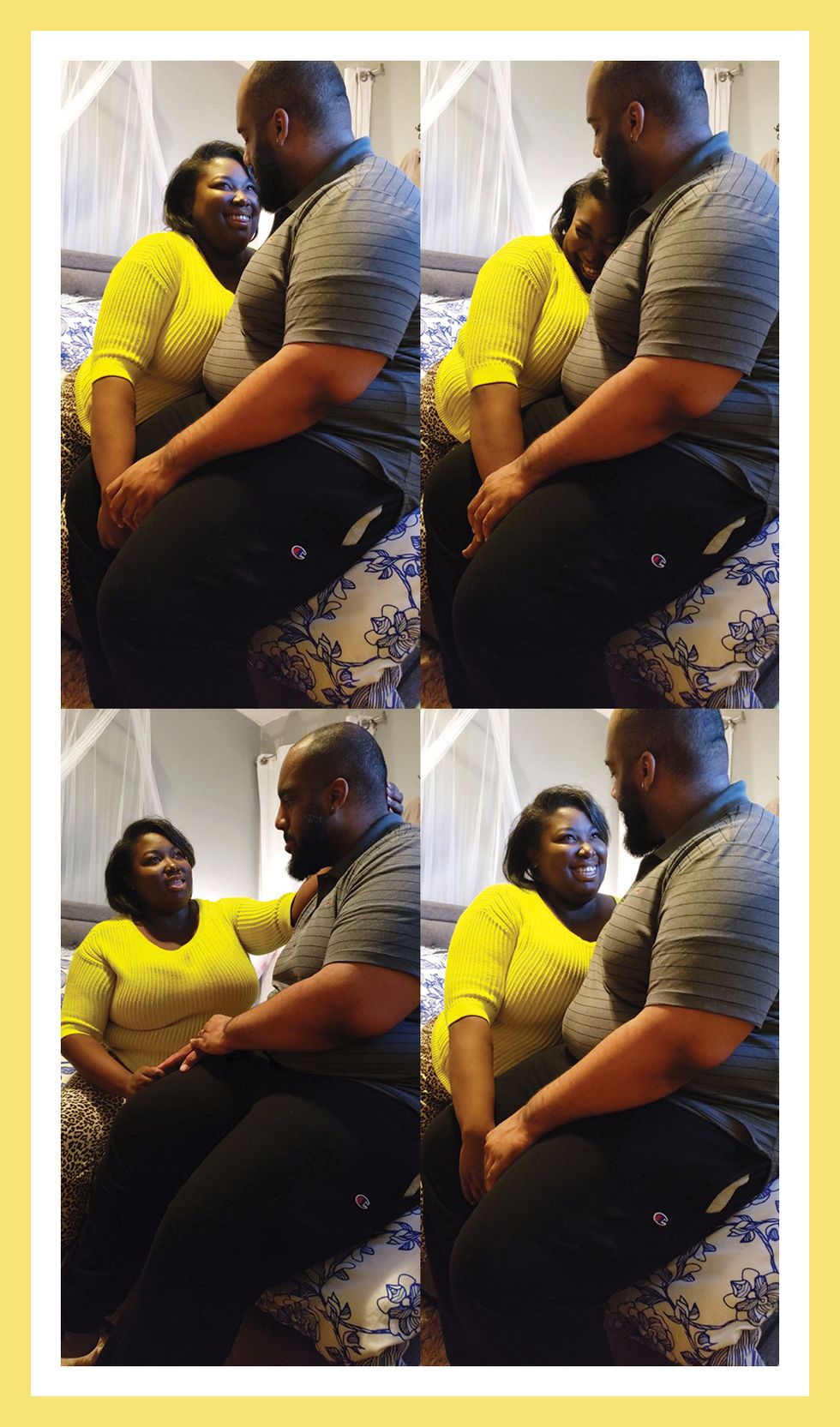
Dani says that her involvement with a group called "Black & Poly" came "out of a need to find other people who were not only poly, but people of color." Alongside her partner, Lucky, Dani sought a community that pushed against the perception that non-monogamy is centered within white-dominated spaces and facilitated discussions about topics exclusive to black, non-monogamous couples. And though she's only been an official member of the community for the past month, the couple — who've been together for two years — has been familiar with Black & Poly's mission, as they approached their relationship as non-monogamous almost from the get-go.
"Oftentimes polyamorous couples are just the people who have more access to living alternative lifestyles," Dani muses, before Lucky adds: "Things like time and disposable income — those luxuries are things that, historically, don't favor people of my color."
The two also point out that black poly couples tend to be scrutinized by the black community at large thanks to traditionalist expectations tied to strong church connections. "People get dragged or secrets are shared," whether that comes in the form of being taken to task online or being "exiled" at family functions, Dani says. "There's also a belief that your destiny is already written and decided, and anything counter to the large picture painted for you is unacceptable. It's the fear of being judged or disappointing others."
So even when couples do feel comfortable sharing with their families, "a lot of times the conversation doesn't really lead to discussions about a lot of the structures that are part of black society," she explains. "To discuss [polyamory] is to put yourself in a very vulnerable space on top of having to come out. It's battling cultural stigma as well as societal stigma."
Grateful to have each other, both Dani and Lucky have resolved to keep studying other non-monogamous relationship models in order to continue adapting their own practice and create a relationship that's mutually productive and fulfilling. "If I'm being truly honest with myself, I know that I haven't found this kind of depth within other individuals," Lucky says of his partner. "It has a lot to do with [Dani] being who she is and the fact that our non-monogamy is built a lot around communication. Communication is non-negotiable and happens all the time between us — hard conversations, especially."
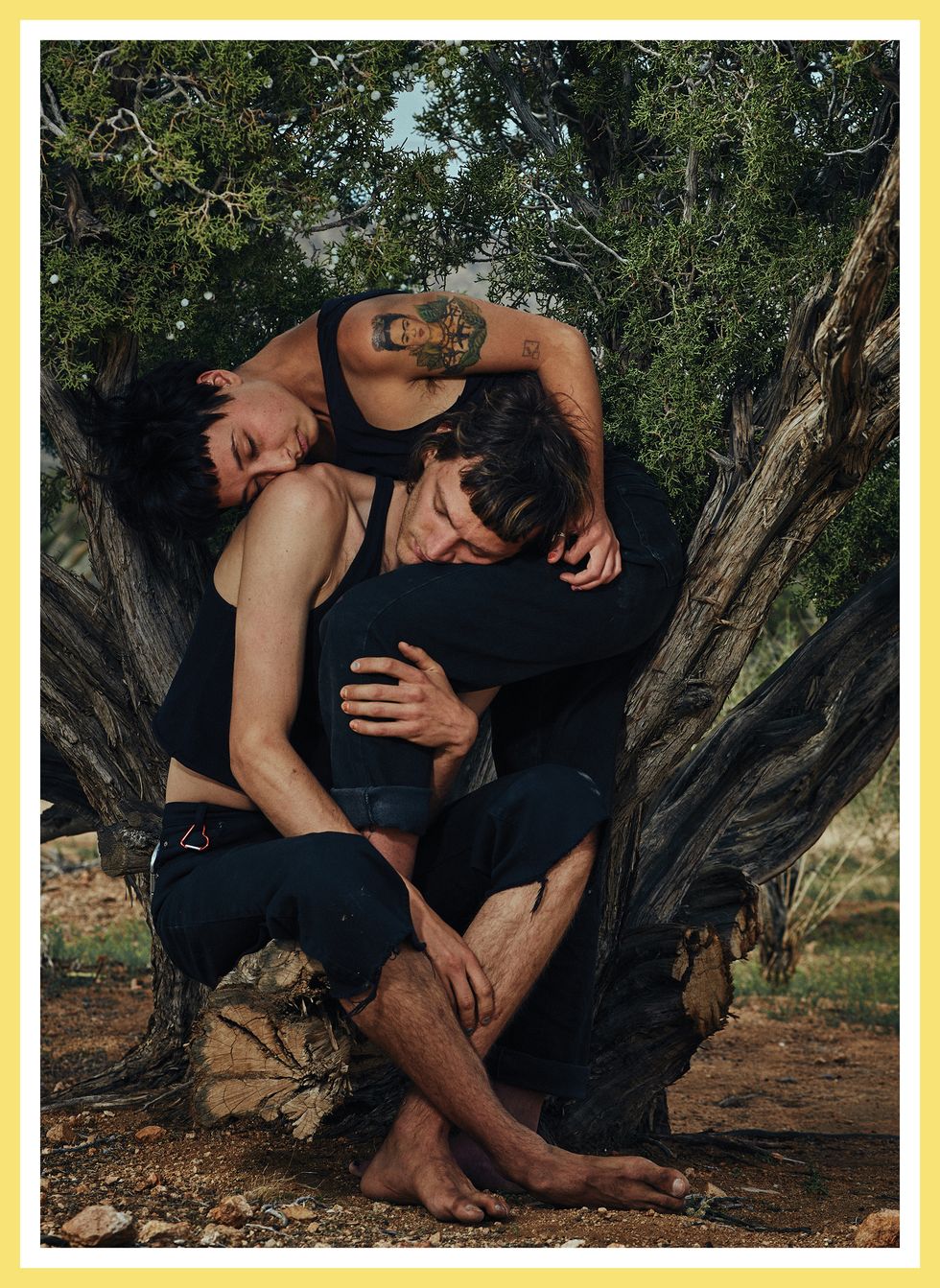
Over the past year, Sal Mori and Se Collier found common ground over a shared approach to several aspects of their lives, including the desire to "hold space for each other to pursue who and what we want to, individually," according to Sal.
Spurred by negative experiences within monogamous relationships, both Sal and Se wanted to begin their relationship as non-monogamous. Their embrace of non-monogamy also ended up dovetailing with their individual unlearnings of gender and relationship norms through an exploration of queerness and transness. "We're both non-binary, and part of that has been releasing our learned ideas about our own genders…and deciding from our own conceptions of self how we want to build our own understandings of gender and how we want to relate to other people," Se explains, adding that they're both "always in a process of unlearning and shedding those [societally mandated] layers."
Sal agrees with this holistic aspect of their decision to pursue non-monogamy: "Being queer and trans, it is crucial for me to allow space for my own identity to shift, as well as the ways that I connect and relate to people.
"I think they kind of go hand in hand. As we explore queerness and transness within ourselves, it opens up curiosities to explore that in other people," Sal continues. "It's a fluid thing that's ever-shifting, and it's never gonna be the same as it looks right now."
Like any other relationship, it's a learning process and there are "ebbs and flows," but both of them say non-monogamy has only empowered and strengthened their connection. Additionally, Sal says, their pursuit of non-monogamy is a reflection of their mutual interest in pushing against deeply internalized values and relationship structures that "don't hold space for fluidity and acknowledgment that we're very fluid human beings."
Se also cites their interest in non-monogamy as something rooted in a disagreement with what they see as monogamy's emphasis on concepts like restriction and ownership. "More than just shedding monogamy, I want to shed all the layers of coercion that are really common in the way that we learn to present romance," Se says. "In society, that seems to involve a lot of sacrifice, and that's a glorified aspect of relationships that I'm not interested in recreating."

A recent transplant to Chicago, Andy met Vanessa at a concert last summer. Vanessa immediately expressed her long-time desire for an open relationship, and after three months together, the two began actively exploring non-monogamy.
Citing mental health as a big determining factor in her decision to pursue non-monogamy, Vanessa explains that she had always been insecure and jealous in her previous, monogamous relationships, though she had always been curious about being open. In late 2017, she says she began taking antidepressants and became an "entirely different person" — one sans insecurity and jealousy, as well as possessing of a "larger, deeper understanding of what I wanted." Subsequently, she decided that she was ready to pursue non-monogamy — something that she says she made clear to Andy when they got together the following summer.
"Plainly, the older I get, the less monogamy makes sense to me," Vanessa says, explaining that she's always just genuinely loved getting to know people and forming relationships with them — whether they be platonic or romantic. "I don't understand restricting my partner or being restricted if my partner is committed to me...I know who I want to come home to at the end of the day."
However, she does acknowledge that it can be hard for people — including her partner — to separate sex and intimacy in their minds. That said, she's quick to clarify that "Andy is the one I think about and focus on all the time," and that, if anything, practicing non-monogamy has made her appreciate Andy even more. "It's hard to be in this kind of relationship, because it requires a lot of communication and frankness," Vanessa explains, adding that Andy initially had a difficult time adjusting to non-monogamy. "But I went ahead with Andy as my primary because he's the type of person who's very open-minded in terms of challenging social norms. He's interested in challenging his own insecurities and boundaries in order to grow as a person."
And for Andy's part, while there are admittedly still some struggles surrounding jealousy and insecurity, through his own time in therapy (and, of course, ample discussion with Vanessa), he believes that pushing his relationship boundaries has really helped him grow as a whole, especially when it comes to facing his co-dependency issues. "It's definitely a dynamic that makes a relationship healthier and more honest — more in the moment," he says, though he mentions that the teasing he experiences from co-workers about her "having a parade of men" does still affect him at a level. "Of course, it's difficult, but the things I'm learning are things I should've been working on anyway. This relationship's been a nice push to be more confident, more understanding."
"I am a little insecure that she's so beautiful and has a lot of friends," he admits. "And I do worry that she's more 'successful' at it than I am." That said, Andy has recently begun hanging out with someone new as well — something he says has helped him feel much more comfortable with their set-up and reaffirms the fact that "the time I spend with another person has nothing to do with what me and Vanessa have."
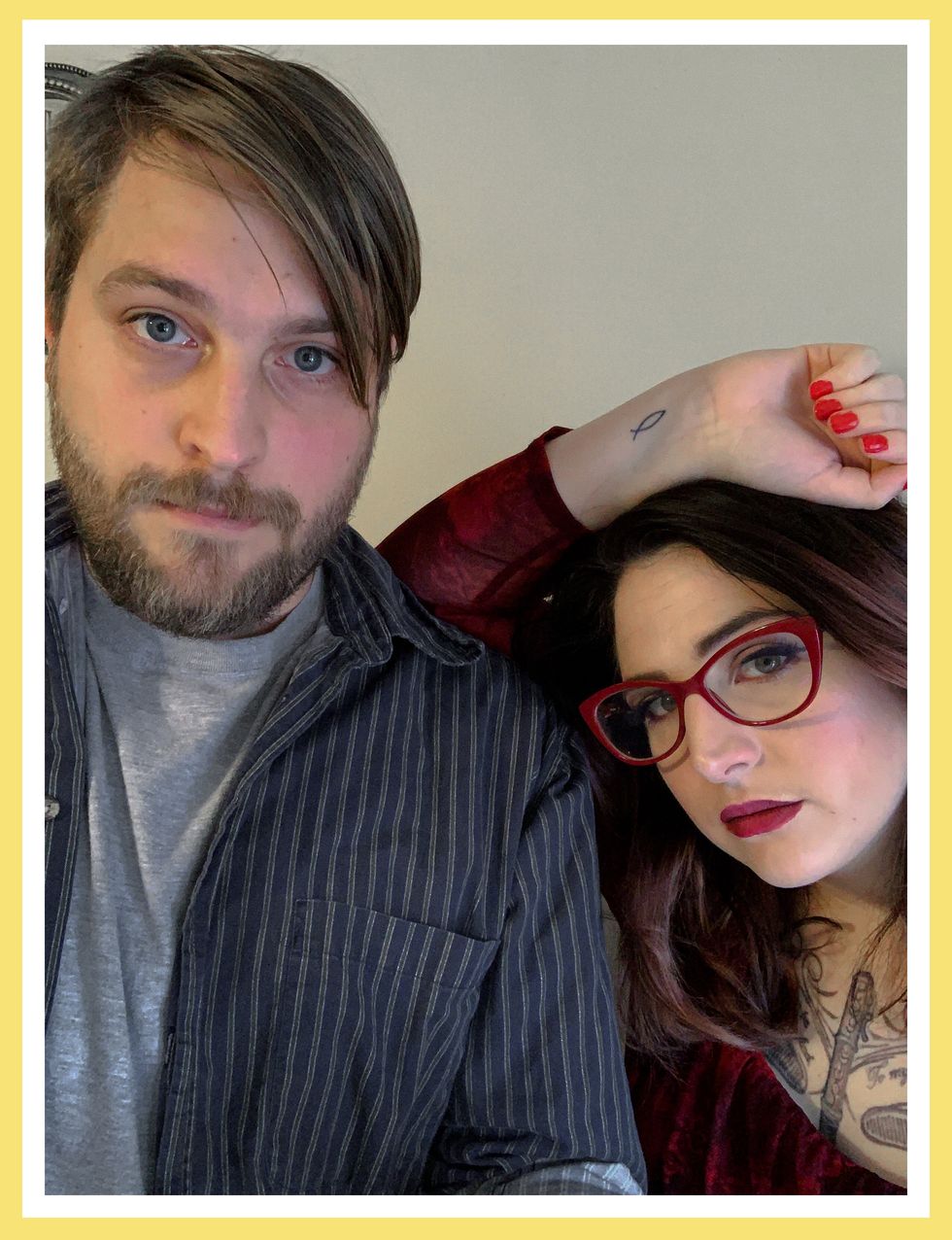
Married for 10 years with 2 children, Daniel and Jennifer C. Martin met the summer after high school graduation and got engaged the following year. Raised in conservative, evangelical Christian households in Tennessee that put a premium on the concept of purity, they began their relationship as a "normal," monogamous couple. However, the two decided to make the switch to polyamory three years ago after Jennifer began to realize she was "having trouble" abstaining from flirting or feeling attracted to other people and decided to stop feeling shame about it.
And while embracing polyamory was a decision that also forced them to leave the evangelical church they grew up in, their faith remains steadfast. Having rejected what they felt to be limiting, literalist interpretations of Jesus' teachings, the Martins argue that the models of marriage depicted in the Bible are ill-equipped to tackle the way contemporary society is structured. They've found solace and a community that shares these values at their current church, the United Church of Christ, in their adopted hometown of Richmond, Virginia, and say that they're "out" and very welcome in their faith community, even as they've received pushback from their own families. That said, they also acknowledge that the way their progressive denomination approaches contemporary socio-political issues is the exception rather than the norm.
However, neither of them sees a conflict between their practice and the message of Jesus. "The fundamental truth of God's message really is, 'Love your neighbor and love God,'" Daniel explains, before emphasizing that both of them value forming meaningful relationships with other people — unfettered by the antiquated tenets of monogamy. "With polyamory, it's nothing more than an expression of love and a way to have deep, meaningful relationships with others."
After all, at the basis of every healthy relationship is open communication, and the Martins believe that being honest with each other about their desire to realize all different forms of love and affection is of utmost importance. Not only that, but as Jennifer (aptly) argues, things like "greed, racism and homophobia are more harmful than the fact I have sex with more than one person."
"I'm living a life that's in line with my values as a Christian. My values are to love my neighbors, to be kind to my enemies," she concludes. "So how does any of that go against non-monogamy? How does who you have sex with determine how Christlike you are on earth?"
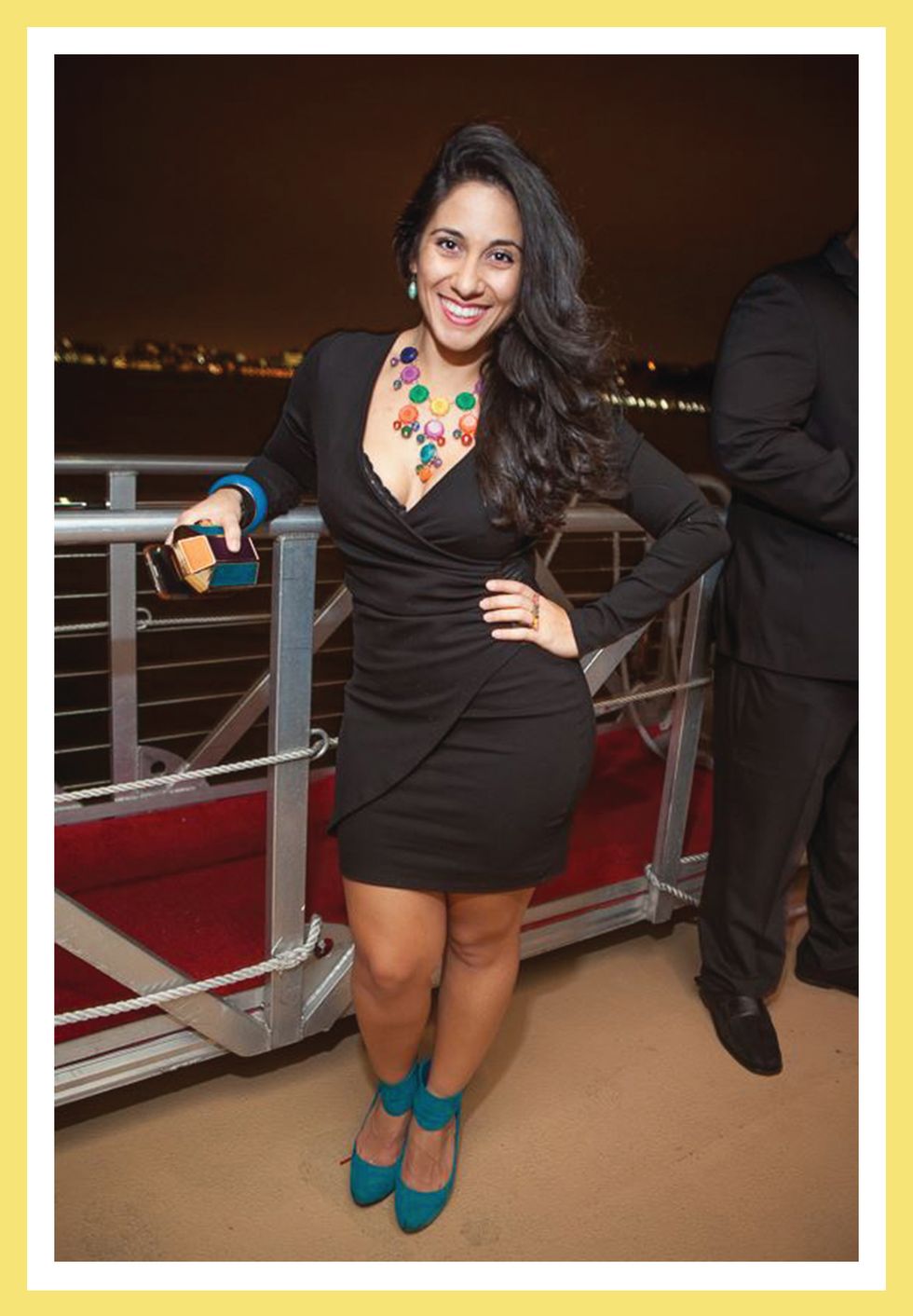
According to Parnia Nyx, she's always practiced ethical non-monogamy, being solo polyamorous "without knowing it." However, in the two years since she discovered the terminology — a fluid term describing a poly person who considers themselves single, or one who has committed partners but prioritizes the relationship with themselves over any other — she hasn't hesitated to dive into the community and, in the process, actively reject our society's normalization of a "one-size-fits-all" relationship model. Instead, she opts to structure her relationships in a "kitchen table," non-hierarchical, egalitarian way. In so many words, that means that Parnia exercises personal autonomy while still loving her partners "individually and wholly," as they are of equal emotional value to her.
While she originally began by calling her partner in New York her "primary," something just never felt right about the word. After reading a Facebook post by Joreth Innkeeper, who coined and championed the concept of "primaries," she figured out that what made her uncomfortable "was the way the term insinuates a disempowering of your other partners.
"It's not egalitarian," Parnia continues. "That was the solidifying point for me; [establishing a hierarchy] almost felt as if it was immoral to me."
While she's based in New York, home of one of her committed partners, Jason, Parnia also travels to see her other partner in Los Angeles, Ron. Though he has other partners in addition to Parnia, Ron also presents as a solo polyamorist. And while he and Parnia are long-distance, Parnia's quick to establish that, as is the case with her two partners, she is equally important to Ron as his other partners who live in California. Referring to the first time she met his other partners, Parnia says "it was like being welcomed with open arms into a space that was carved out for me."
But Parnia doesn't find every aspect of polyamory to be as ideal as her own personal experiences. As a woman of color, she's particularly tuned into the racial blind spots present in many media representations of non-monogamy. Lamenting that mainstream representation of non-monogamy tends to center around white people, she says, "White people have also Columbus-ed polyamory to be a revolutionary tool, claiming it to be political, yet centering it around sex," continuing on to cite the fact that many non-European cultures have practiced some sort of polyamory far before colonization. "We're living in such a racist and white supremacist environment that has taught people of color to hate themselves and each other," Parnia concludes. "We are villainized, exotified, marginalized, exploited, sexualized, disenfranchised, and victims of hateful violence. Polyamory for people of color is a reteaching and decolonization of love — a reclaiming of polyamorous practices. Now that's a political weapon."

Five years after Nick San Pedro and RuPaul's Drag Race alum Derrick Barry started dating, they met Mackenzie Claude (aka drag queen Nebraska Thunderfuck) at an afterparty in Las Vegas. Little did they know that they would soon be hanging out almost every day and eventually become an inseparable unit, as both lovers and artistic collaborators.
"A few months into it, I just kind of realized that we were basically in a relationship, just without the label," Mackenzie recalls. "I'm super territorial, so it was important for me to put boundaries on the relationship and make it closed. Like, if anyone even looks at them the wrong way, I see red." Thankfully though, both Derrick and Nick were open to being in a closed, "trinogamous" relationship, and the three have enjoyed a fulfilling seven-year partnership with each other.
Their relationship is polyfidelic — i.e. a committed relationship that's "comparable to a relationship between two people," per Nick. And though some may have questions about the way they handle the added burden of fame, fans and attention within their relationship, all three assert those aren't problems at all, as they only have eyes for each other. "All the rules are the same; we're just adding one extra person," Nick says, before Mackenzie voices his frustration with people who believe they can be their fourth partner.
"[Our relationship] isn't a revolving door," he says, before adding that there's no jealousy within their relationship. "They both fulfill me, and I appreciate the love Nick and Derrick share, because I love them and want them to love each other. If there's any jealousy, it's from other people outside the relationship."
Derrick agrees, even going so far as to say it gives him peace of mind to know that Mackenzie and Nick have each other when he's on the road, as he no longer feels guilty about leaving a partner at home alone. "I don't have to worry about them feeling alone or sad, or wonder if they're with other people," he explains. "They take care of each other and hold the other accountable." Not only that, but Mackenzie is quick to emphasize that "everything is very balanced" in their relationship and that they view themselves as individuals who feed each other romantically, spiritually and creatively. "We are three gay men in a relationship, so we keep everything very balanced," he explains. "We aren't brother-husbands, we don't really have those jealousy issues, because it's like we're a team."
However, that's not to say they don't have their own stumbling blocks. As Mackenzie continues, "You have three different people, three different mindsets. You're constantly having to remind everyone that you're on the same team and making sure you're all on the same page."
Welcome to "Sex with Sandra," a column by Sandra Song about the ever-changing face of sexuality. Whether it be spotlight features on sex work activists, deep dives into hyper-niche fetishes, or overviews on current legislation and policy, "Sex with Sandra" is dedicated to examining some of the biggest sex-related discussions happening on the Internet right now.
Photos Provided / Lead Image by Se Collier